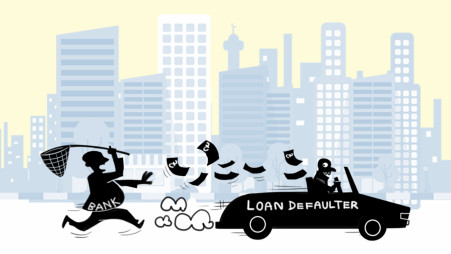Once gone sour, most loans become bad
Such loans are constantly increasing, research finds

Most of the default loans in the financial sector have turned into bad loans, with the amount of such loans rising by Tk3,273 (3.3%) thousand crore in 2019 compared to the year before, research has found.
The research, undertaken by the Bangladesh Institute of Bank Management (BIBM), found that bad loans were constantly increasing, describing the issue as a matter of grave concern for the stability of the financial sector and the overall economy.
Prominent bankers of the country discussed the research findings in a webinar on Wednesday.
While presenting the research paper, entitled "NPL in Banks of Bangladesh: Macro Economic and Bank Specific Perspective", BIBM Associate Professor Md Alamgir said bad loans accounted for 83.2% of default loans in 2018, which increased to 86.3% in 2019.
Default loans are classified into three levels. Substandard is the first level, while doubtful and bad are the second and third levels respectively. Bad loans become difficult for banks to recover.
The BIBM research notes that a large number of defaulters have defaulted on purpose and have not been repaying loans despite being capable enough to do so.
Humayun Kabir, executive director of the central bank, agreed with the research findings, saying a large portion of bad loans had been taken out by willful defaulters.
It is very difficult to recover money from those who do not want to repay loans, he said.
Expressing disappointment over bad loans, the Managing Director of First Security Islami Bank, Syed Waseque Md Ali, said there is nothing to recover when more than 80% of default loans turn into bad debts.
The Managing Director of Sonali Bank, Md Ataur Rahman Prodhan, said procrastination is a big problem when it comes to recovering loans through legal measures.
It is possible to reduce default loans if long-term loan burdens of banks can be reduced, he said.
Ataur emphasised strengthening the capital market further by describing it as a source of long-term financing.
Syed Mahbubur Rahman, managing director of Mutual Trust Bank and a former president of the Association of Bankers Bangladesh, said default loans cannot be recovered by selling properties that are kept as collaterals.
Apart from collaterals, he suggested maintaining caution by considering the ability of the client to repay the loan before lending and reviewing whether the client's business is going well.
The research cited high interest rates, poor client selection, over-lending to good clients, delay in loan disbursement, and under-lending as reasons for the rise in default loans.
It said clients' low perceptionof business risk, political influence and instability, inefficiency in bank management and a lack of good governance are also reasons for the rise in default loans.
The research urged the authorities concerned to put an end to political influence or interference in the loan approval process to avoid the risk of loan default.
Acknowledging political influence in loan approval, Deputy Governor of the Bangladesh Bank SM Moniruzzaman said, "We should get out of this practice."
To reduce default loans, the BIBM research recommended creating a separate database in collaboration with the central bank. Using the database, banks will be able to easily identify borrowers and know which bank lent how much to whom.
Loan classification was suspended until December due to the Covid-19 pandemic.The BIBM research said if this facility is withdrawn, default loans may increase substantially and debt rescheduling pressure may increase as well.
Moniruzzaman held out the assurance that appropriate steps would be taken in this regard.



 Keep updated, follow The Business Standard's Google news channel
Keep updated, follow The Business Standard's Google news channel














